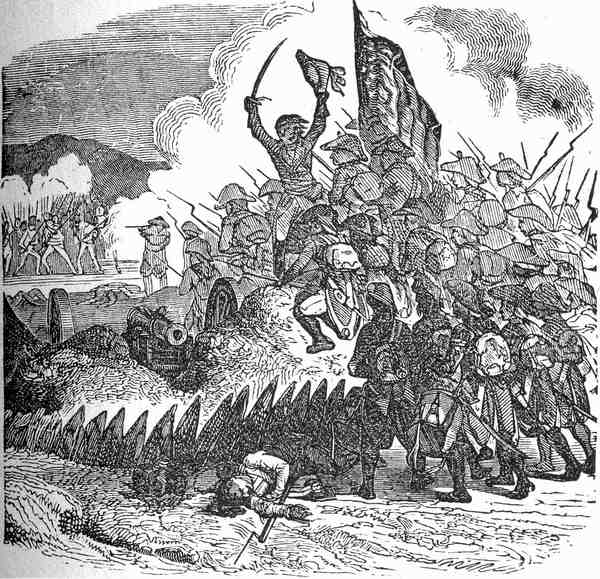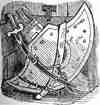Thrilling Incidents In American History
• Preface
Revolutionary War
• Opening Of The Revolution
• The Boston Massacre
• Affair of the Sloop Liberty
• Affair of the Gaspee
• The Tea Riot
• The Boston Port Bill
• The First Continental Congress-Consequent Parliamentary proceedings
• Organization of the Minute-Men
• Patrick Henry-Second Provincial Congress-First Military Enterprise
• Battles of Lexington and Concord
• Battle of Bunker's Hill
• Capture of Ticonderoga
• Second Continental Congress-Washington's Appointment
• Siege of Boston
• Incidents at the Evacuation of Boston
• Burning of Falmouth
• Arnold's Expedition to Quebec
• Siege of Quebec, and Death of Montgomery
• Scenes at Quebec during the Siege
• Expedition against Charleston
• The Declaration of Independence
• The Battle of Long Island
• Washington's Retreat through New Jersey-Capture of General Lee
• Battle of Trenton
• Battle of Princeton
• Capture of General Prescott
• Battle of Brandywine
• Battle of Germantown
• Battle of Red-Bank
• Attack on Fort Mifflin-Retirement of the Army to Valley Forge
• Battle of Bennington
• Murder of Miss M'Crea
• Battle of Stillwater
• Battle of Bemis' Heights, and Retreat of Burgoyne
• Capture of Forts Clinton and Montgomery
• Surrender of Burgoyne
• The Treaty with France
• Attack on Savannah, and Death of Pulaski
• Storming of Stony Point
• General Sullivan's Campaign against the Mohawks
• Tarleton's Quarters
• Battle of Camden, and Death of De Kalb
• Arnold's Treason
• The Loss of the Randolph
• The British Prison-Ships
• Capture of the Serapis
• Putnam's Feat at Horseneck
• Battle of Eutaw Springs
• Wayne's Charge at Green Spring
• Capture of the General Monk
• The Mutinies
• Battle of the Cowpens
• Capture of New London
• Massacre of Wyoming
• Surrender of Cornwallis
War With France
• Capture of L'Insurgente
• The Constellation and Vengeance
War With Tripoli
• Burning of the Philadelphia
• Bombardment of Tripoli
• Loss of the Intrepid
• Expedition of General Eaton
Second War With England
• Battle of Tippecanoe
• Capture of the Guerriere
• Tragical Affair of an Indian Chief
• Battle and Massacre at the River Raisin
• Captain Holmes's Expedition
• Capture of the Caledonia and Detroit
• The Wasp and Frolic
• Gallant Conduct of Lieutenant Allen at the Capture of the Macedonian
• Capture and Destruction of the Java
• Siege of Fort Meigs
• Capture of York, and Death of General Pike
• Defence of Sackett's Harbour
• Defence of Fort Stephenson
• Battle of Lake Erie
• Battle of the Thames
• Gallant Action of Commodore Chauncey under the guns of Kingston Citadel
• The Sacking of Hampton
• Capture of the Peacock
• Massacre at Fort Mimms
• Surrender of Weatherford
• Battle of Niagara
• BattIe of New Orleans
War With Mexico
• Battle of Palo Alto
• Battle of Resaca de la Palma
• Capture of Monterey
• Battle in the Streets of Monterey
• Thrilling Scenes in the Battle of Buena Vista
• Bombardment of Vera Cruz
• Battle of Cerro Gordo
• Battles of Contreras and Churubusco
• Storming of Chapultepec


Battle of Bennington.
BATTLE OF BENNINGTON.
 HE advance of General Burgoyne's
army from Canada
towards New York, which
took place in the summer of
1777, threw the whole country
into the most vivid
alarm. When he had captured
Fort Ticonderoga, and
advanced as far as Fort Edward, he received a sudden
check in an attempt to supply his army with provisions.
HE advance of General Burgoyne's
army from Canada
towards New York, which
took place in the summer of
1777, threw the whole country
into the most vivid
alarm. When he had captured
Fort Ticonderoga, and
advanced as far as Fort Edward, he received a sudden
check in an attempt to supply his army with provisions.
It was well known that the American army received live cattle from New England, which were collected at Bennington, twenty-four miles east from the Hudson, where a large deposit of carriages, corn, flour, and other necessaries, had been made. For this purpose he moved down the east side of the Hudson, and encamped nearly opposite Saratoga, which place the American army left on the 15th of August, and retreated to the confluence of the Mohawk and Hudson rivers. He sent his van across the river by a bridge of boats; and at the same time despatched Colonel Baum, a German officer, with five hundred men, partly cavalry, two pieces of artillery, and one hundred Indians, to surprise Bennington.
General Stark, with the New Hampshire militia, four hundred strong, happened to be in that vicinity, on his way to join General Schuyler. He heard first of the approach of the Indians, and soon afterwards was informed that they were supported by a regular force. He collected his brigade, sent expresses to the neighbouring militia to join him, and also to Colonel Warner's regiment at Manchester. On the morning of the 14th of August, he marched against the enemy at the head of seven hundred men; and sent Colonel Gregg, with two hundred men, to skirmish in their front and retard their progress. He drew up his men in order of battle; but, on coming in sight of him, Baum halted on advantageous ground; sent an express to General Burgoyne informing him of his situation; and fortified himself as well as circumstances would permit.
Some small skirmishing parties of the Americans killed several Germans, and two Indian chiefs, without sustaining any loss; and this slight success not a little elated them. In a council of war, it was resolved to attack Baum next day; but next day it rained incessantly, and the attack could not be made, although there was some skirmishing.
On the morning of the 16th, Stark, having received some reinforcements, sent detachments by the right and left of the enemy, with orders to unite in their rear, and begin the attack in that quarter. But before they met, the Indians retreated between the columns, and, receiving a fire as they passed, sustained some loss. The detachments, according to orders, began the attack on the rear of the enemy, and were assisted by Stark, who instantly advanced to the charge in front. Baum made a brave defence; the battle lasted two hours, during which he was furiously assailed on every side by an incessant discharge of musketry. He was mortally wounded; his troops were overpowered; a few of them escaped into the woods and fled, pursued by the Americans; the rest were killed or taken prisoners. Thus, without artillery, with old rusty firelocks, and with scarcely a bayonet, these American militia entirely defeated five hundred British veterans, well armed, provided with two pieces of artillery, and defended by breastworks.
After the victory the greater part of the militia dispersed in quest of booty, and their avidity for spoil nearly proved fatal to them; for, on receiving Baum's express, General Burgoyne ordered Colonel Brehman, who had before been sent forward to Batten Hill for the purpose, to march to the assistance of his countrymen with the Brunswick grenadiers, light infantry, and chasseurs, amounting to five hundred men. Colonel Brehman set out at eight in the morning of the 15th; but the roads were rendered almost impassable by incessant rains; and, although he marched with the utmost diligence, yet it was four the next afternoon before he reached the vicinity of the place where his countrymen had been defeated. The first notice which he received of Baum's disaster was from the fugitives whom he met. He easily repulsed the few militia who were in pursuit of them; and, from the scattered state of Stark's troops, had the prospect of being able to make himself master of the stores, which were the great object of the expedition. But, at that critical moment, Colonel Warner's regiment of continentals arrived, and instantly engaged Brehman. The firing reassembled the scattered militia, who joined in the battle as they came up. Colonel Brehman maintained the conflict till dark; when, abandoning his artillery and baggage, he retreated, and, escaping under cover of night, with the shattered remnant of his detachment, regained the camp.
In these engagements the Americans took four brass field-pieces, about one thousand muskets (a most seasonable supply to the ill-armed militia), nine hundred swords, and four baggage-wagons. Exclusive of Canadians and other loyalists, the loss of the royal army could not be less than seven hundred men in killed, wounded, and prisoners, although General Burgoyne stated it at only about four hundred. The Americans admitted the loss of about one hundred in killed and wounded; but this was certainly under the truth.
This was the first check which General Burgoyne's army had met with, and it was a severe one, and had a fatal influence on the campaign. The loss of a few hundred men was nothing compared with the effects which it produced upon the minds of the people: it greatly elated them, and gave the militia, who had been much dispirited by the late defeats, confidence in themselves, and encouraged them to hasten to the army in great numbers, in order to consummate the work which they had begun. Before the events in the vicinity of Bennington, dejection and alarm pervaded the northern provinces; but those events dispelled the gloom, infused spirit and vigour into the militia, and gave a new aspect to affairs on the Hudson.
